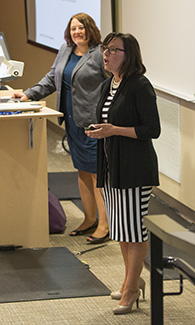Thursday, September 24, 2015
LUCOM-SGA hosts AACOM to encourage political involvement
Thu, 24 Sep 2015Shelley Andrews :: LUCOM Marketing and PR
Student-doctors at Liberty University College of Osteopathic Medicine (LUCOM) received a chance to learn about the difference between policy and politics and how each affects the profession they are striving to enter.
LUCOM Student Government Association (LUCOM-SGA) welcomed two leaders from the government relations’ office of the American Association of Colleges of Osteopathic Medicine (AACOM). The open-forum, called “Advocacy 101”, gave student-doctors an opportunity to hear straight from a supportive source why they should be engaged and vocal on issues that have a long-term impact on their medical education, their future practices and the health of the patients they are preparing to serve.
“My goal for this event is to help my classmates realize that their voice matters. AACOM works extremely hard defending important issues that if not addressed would negatively affect our education and alter our future choices,” said Anya-Faye Pacleb, second-year student doctor and Vice-President of LUCOM-SGA.
 “Apathy is their worst enemy,” said Pamela Murphy, AACOM Vice President of Government Relations. “Their voice and their partnership is what matters at the federal level, the state level and the local level.”
“Apathy is their worst enemy,” said Pamela Murphy, AACOM Vice President of Government Relations. “Their voice and their partnership is what matters at the federal level, the state level and the local level.”
Murphy and AACOM Director of Congressional Affairs Mary Lynn Bender discussed one of their major priorities at this time: the need for expansion of Graduate Medical Education (GME) opportunities. “With rising class size expansions and new colleges of medicine like LUCOM, there is the potential to help make up for a projected shortage of 90,000 + physicians in 2015,” said Bender. “Congress needs to act fast in order to increase the number of resident positions available to graduates.”
Bender and Murphy are concerned based on projections from national patient advocacy and health care associations that demonstrate that the shortage of GME slots will show results in access issues and shortages in multiple health care specialties.
“We never want to reach the point where graduating osteopathic or allopathic medical students do not have residency programs in desirable locations and critically needed specialties such as Family Medicine, General Surgery, Internal Medicine or Women’s Health to enter upon completion of their pre-doctoral education,” said Bender.
Throughout Bender and Murphy’s presentation it was clear that it is tough to make your voice heard on Capitol Hill, especially among all the noise that permeates the seat of power for the government and amidst the thousands of different stakeholders. Though they are hopeful. Murphy believes social media, mainly Twitter, is a key element in achieving success in today’s world of rapid response and quick changes.
“Twitter is such a fast, easy, simple means to get a quick message across,” said Murphy.
Whether its joining the AACOM-GR Twitter page or getting involved with a local organization, Ronnie B. Martin, D.O., Dean of LUCOM is encouraging student-doctors to step up and be a part of the discussion.
“There are two types of groups when you are discussing politics; those at the table and those on the menu. If there is one thing that Congressmen and those in all legislatures do well; it is they can count. They are not experts on every issue on which they act. They rely on their staff and the feelings of their constituents. They review the response on issues and if numbers are low, it is noticed and assumed it is not important to ‘the people.’ If, however, the response is large in numbers or one sided, they become motivated to react. I’ve been advocating in D.C. since 1970…each response is important. It counts because they count,” said Dr. Martin.